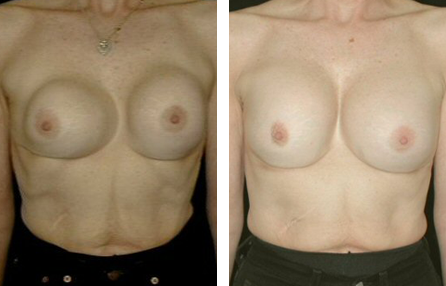Breast Implant Revision, Exchange or Removal at Kirn Plastic Surgery and Skin Care Center
Occasionally, it may be necessary to revise, exchange, or remove breast implants. Common reasons for this include implant leaks, capsular contracture (scar tissue formation around the implant), or a personal desire to change breast size. These revisionary procedures are tailored specifically to each patient’s unique needs and goals.
The complexity of revision procedures can vary greatly—some may be more intricate than the original surgery, while others might be less involved. To effectively address specific concerns, a range of techniques may be employed, including the use of spacers or mesh to ensure the stability of the implant’s position.
The practice has ultrasound imaging capabilities which can help determine the status of breast implants. Specifically, ultrasound imaging can provide valuable information as to whether a gel filled breast implant is leaking or intact. This information is helpful for monitoring implants and in pre-surgical planning for breast implant revisionary procedures.
To optimize the consultation and planning process, having detailed information about the previous surgery is extremely beneficial. This includes knowing the size and model number of the existing implants, which can significantly influence the approach to revision.
Before & After Gallery
Dr. Kirn and Dr. Al Bayati are Plastic Surgeons devoted to advanced techniques in Cosmetic Surgery of the Face, Breast, and Body.

Breast Implant Revision Frequently Asked Questions
When should I have my breast implants replaced?
There is no mandatory timeline for replacing breast implants. However, you should consider replacement if you experience any problems, or if you wish to change the size or shape of your implants. In such cases, breast revision surgery may be a desirable option. If a leak is diagnosed, the leaking implant(s) should be replaced.
The FDA recommends monitoring gel breast implants starting at 5-6 years after surgery and every 2-3 years thereafter with ultrasound or MRI to detect silent leaks. Our practice offers ultrasound monitoring as a complimentary service to our patients. If a leak is detected, the implant(s) should be replaced.
I have old silicone implants which have ruptured, how are they removed/replaced?
The same incision used for your initial implant placement is typically used for the exchange procedure. When dealing with ruptured old gel implants, Dr. Kirn and Dr. Al Bayati aim to remove both the leaking implant and the surrounding scar capsule. However, if the implants and scar tissue are too fragile, some free silicone gel may escape into the breast tissue or may have already escaped prior to surgery.
During the operation, every effort is made to remove all the silicone gel, but it is usually impossible to remove every drop. Leaving a small amount of old gel in the breast typically causes minimal, if any, issues. The primary goal is to create as clean a pocket as possible for the new implant, if one is being placed.
How do I determine if my breast implants are leaking?
If saline implants leak, they usually deflate over a relatively short period of time—within hours or a few days—making it quite apparent. In contrast, leaks in silicone gel implants are more difficult to diagnose and cannot typically be detected through a physical exam.
Dr. Kirn and Dr. Al Bayati perform ultrasound evaluations in our office during your consultation, which is usually a reliable method to determine if an implant has ruptured. In some cases, MRI studies may be necessary to confirm the diagnosis. We offer complimentary ultrasound monitoring for all patients on whom we place breast implants.
Is it possible to place new breast implants after removal of old ruptured gel implants?
What will my breasts look like if I remove my implants and do not replace them?
The appearance of your breasts after implant removal (explantation) can vary significantly from patient to patient. In many cases, Dr. Kirn and Dr. Al Bayati recommend combining a lift operation with the removal of implants to improve breast shape if the implants are not being replaced. Alternatively, it may be best to simply remove the old implants, clean out the scar tissue, and allow the breasts to shrink down naturally before considering any additional procedures.
After implants are removed and not replaced, the breast tissue will contract, and this process usually takes six months to a year to complete.
Should I change my current saline implants out for gel implants?
There are no mandatory requirements for implant replacement if you are not experiencing any problems. However, many patients with long-term saline implants choose to replace them preemptively. Gel implants are often preferred for their natural feel compared to saline implants. Other reasons for considering surgery include a desire for a size change, shape change, or improvement in symmetry.
Related Procedures
Meet Dr. David Kirn
Dr. David Kirn is an American Board of Plastic Surgery Certified Plastic Surgeon who is devoted to advanced techniques in Cosmetic Surgery of the Face, Breast, and Body. In private practice since 1998, he is located in a state-of-the-art facility which includes a full service skin care center. The practice is focused on personalized patient care and attention to detail. Where possible, Dr. Kirn utilizes minimally invasive procedures. See Our VIP Surgery Center.
Meet Dr. Ahmed Al Bayati
Having completed his training in plastic surgery and serving as Chief Resident at the University of Kentucky, Dr. Al Bayati brings a wealth of expertise and dedication to his practice. His commitment to advancing patient care and achieving exceptional outcomes reflects his unwavering passion for plastic surgery.
Testimonials
Our testimonials offer firsthand accounts of patients’ experiences, serving as powerful endorsements of our expertise, professionalism, and the quality of care provided.
Patient Testimonial- Doctor






